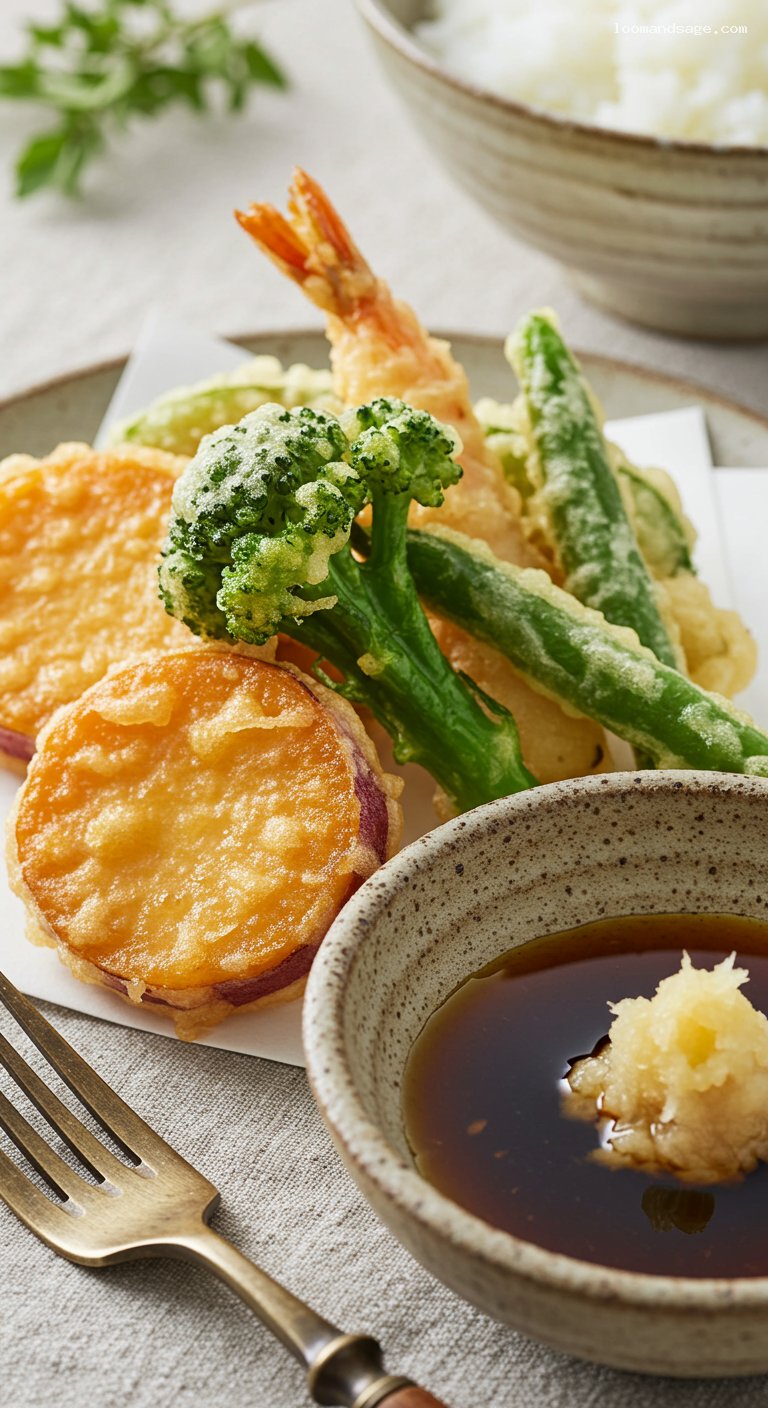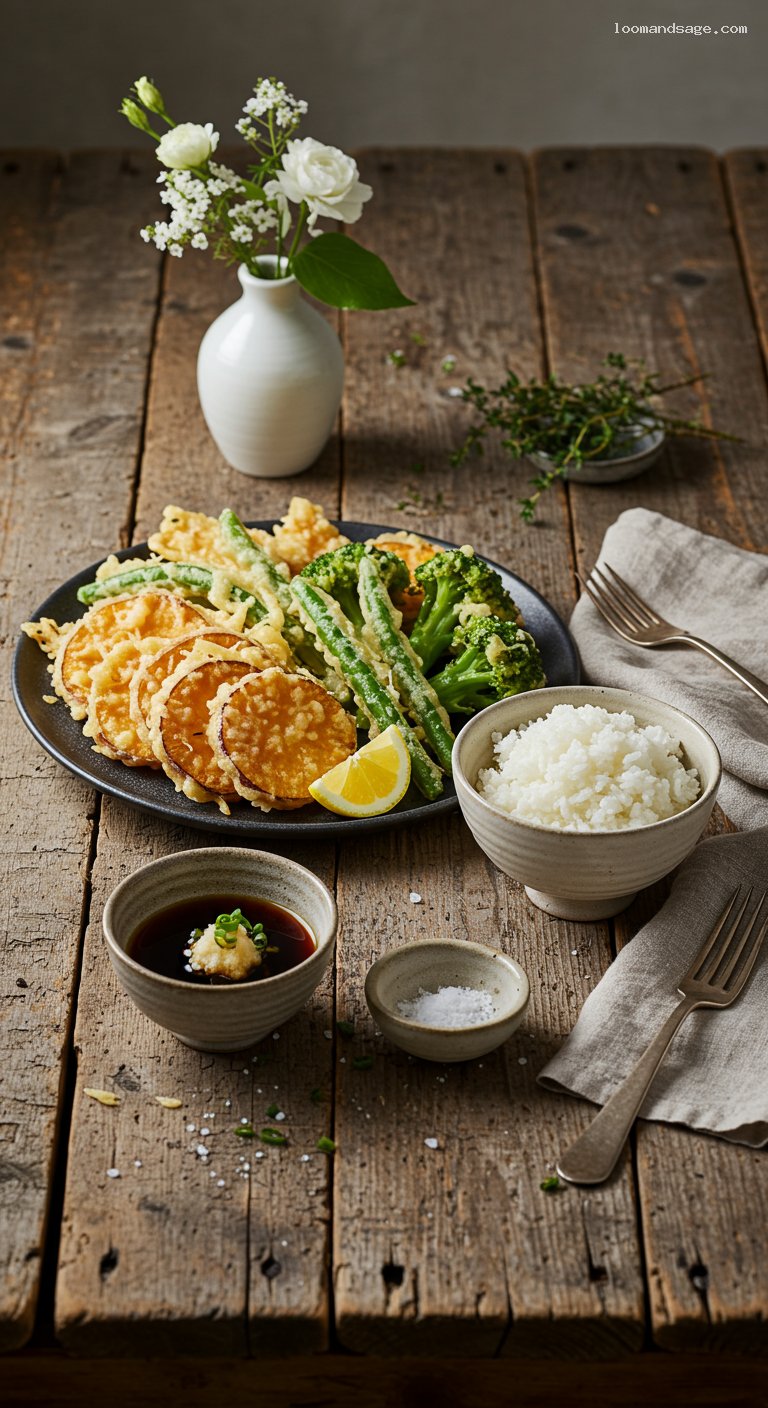Quick Recipe Version (TL;DR)
Quick Ingredients
- Japanese short-grain rice 1 1/2 cups (300 g) + water 1 3/4 cups (420 ml)
- Sweet potato 10 oz (280 g), broccoli florets 8 oz (225 g), mushrooms 6 oz (170 g), green beans 6 oz (170 g)
- Neutral frying oil 2 qt (1.9 L)
- Cake flour 1 cup (120 g), rice flour 1/2 cup (75 g) + 1/3 cup (40 g) for dusting
- Cold egg 1 large, ice-cold sparkling water 1 1/4 cups (300 ml)
- Dashi 1 cup (240 ml), soy sauce 1/4 cup (60 ml), mirin 2 tbsp (30 ml), sugar 1 tsp (4 g)
- Grated daikon 1 cup (140 g); optional: 1 tsp grated ginger, sliced scallion, lemon wedges
Do This
- 1. Rinse rice until water runs mostly clear; cook with 1 3/4 cups water. Keep warm.
- 2. Simmer dashi, soy, mirin, and sugar 1–2 minutes for dipping sauce; keep warm. Grate and drain daikon.
- 3. Prep vegetables: slice sweet potato 1/4 inch thick; pat all veg completely dry.
- 4. Heat 2–3 inches oil to 350°F (175°C). Set a rack over a baking sheet and place 1/3 cup rice flour for dusting nearby.
- 5. Make cold batter: whisk egg with sparkling water, then gently fold in flours just to combine (lumpy is fine). Keep over ice.
- 6. Dust veg with rice flour, dip in batter, and fry in batches until pale golden and crisp (1 1/2–3 minutes by vegetable). Drain on rack.
- 7. Serve tempura with steamed rice, warm dipping sauce, and grated daikon (add daikon to sauce to taste).
Why You’ll Love This Recipe
- Restaurant-quality tempura at home with a light, lacy crust and tender vegetables.
- Balanced set meal: crisp tempura, fluffy rice, and a savory soy–dashi dipping sauce.
- Clear timing and temperatures for stress-free frying success.
- Flexible and weeknight-friendly with easy substitutions and make-ahead components.
Grocery List
- Produce: Sweet potato, broccoli, mushrooms (shiitake or cremini), green beans, daikon radish, fresh ginger (optional), scallions (optional), lemon (optional)
- Dairy: None
- Pantry: Japanese short-grain rice, neutral oil (canola/peanut), cake flour, rice flour, soy sauce, mirin, sugar, dashi granules or dashi base, sparkling water
Full Ingredients
Tempura Vegetables
- Sweet potato 1 medium (about 10 oz / 280 g), scrubbed and sliced 1/4 inch (6 mm) thick
- Broccoli florets 8 oz (225 g), cut into 1 1/2 inch pieces
- Mushrooms 6 oz (170 g) shiitake (stems removed) or cremini, halved if large
- Green beans 6 oz (170 g), trimmed and thoroughly dried
Tempura Batter
- Cake flour 1 cup (120 g), chilled if possible
- Rice flour 1/2 cup (75 g), plus 1/3 cup (40 g) extra for dusting vegetables
- Large egg 1, very cold
- Ice-cold sparkling water 1 1/4 cups (300 ml), plus a little more if needed
- Ice cubes 4–6 (to keep the mixing bowl cold; do not add to the batter)
- Neutral oil (canola or peanut) 2–3 qt (1.9–2.8 L) for frying
Soy–Dashi Dipping Sauce (Tentsuyu)
- Dashi 1 cup (240 ml) — use 1 tsp (4 g) dashi granules dissolved in hot water or prepared from scratch
- Soy sauce 1/4 cup (60 ml)
- Mirin 2 tbsp (30 ml)
- Granulated sugar 1 tsp (4 g)
- Optional: Sake 1 tbsp (15 ml)
Rice & Condiments
- Japanese short-grain rice 1 1/2 cups (300 g)
- Water 1 3/4 cups (420 ml)
- Daikon radish, grated and squeezed of excess liquid, 1 cup (140 g)
- Optional: Fresh ginger, finely grated, 1 tsp (5 g)
- Optional: 1 scallion, thinly sliced; lemon wedges; shichimi togarashi for serving

Step-by-Step Instructions
Step 1: Cook the rice
Rinse the rice under cold water, swishing with your hand, until the water runs mostly clear (3–4 rinses). Drain well. Combine rice and 1 3/4 cups (420 ml) water in a rice cooker and cook on the regular setting, or in a saucepan: bring to a gentle simmer over medium heat, cover, reduce to low, and cook 12 minutes. Remove from heat and rest, covered, 10 minutes. Fluff and keep warm.
Step 2: Make the soy–dashi dipping sauce and prepare condiments
In a small saucepan, combine dashi, soy sauce, mirin, and sugar (plus sake if using). Bring just to a simmer over medium heat, stir to dissolve sugar, and simmer 1–2 minutes. Keep warm over very low heat or transfer to a small serving bowl. Grate the daikon (and ginger, if using), then squeeze gently to remove excess liquid. Set aside.
Step 3: Prep the vegetables
Slice the sweet potato into 1/4 inch (6 mm) rounds. Cut broccoli into bite-size florets. Trim green beans. Wipe mushrooms clean and halve if large. Pat everything very dry with paper towels; moisture causes spattering and a soggy crust.
Step 4: Heat the oil and set up your frying station
Pour 2–3 inches (5–7.5 cm) of neutral oil into a deep, heavy pot or Dutch oven. Heat to 350°F (175°C) over medium heat. Set a wire rack over a baking sheet for draining. Place 1/3 cup (40 g) rice flour in a shallow dish for dusting. Nest your mixing bowl in a larger bowl filled with ice cubes to keep the batter cold.
Step 5: Mix the ultra-cold tempura batter
In the cold mixing bowl, lightly beat the egg with the ice-cold sparkling water. Add cake flour and 1/2 cup (75 g) rice flour. Stir with chopsticks or a fork just 10–12 strokes. The batter should be thin, cold, and a bit lumpy—those lumps create a delicate, airy crust. Keep the bowl over the ice bath and do not overmix.
Step 6: Fry the vegetables in batches
Working in small batches, dust vegetables lightly with rice flour, shaking off excess. Dip a few pieces into the batter, letting excess drip off. Fry 6–8 pieces at a time, maintaining 340–360°F (171–182°C): sweet potato 2–3 minutes, green beans 1 1/2–2 minutes, broccoli 2–2 1/2 minutes, mushrooms 1 1/2–2 minutes. Turn pieces once; they are done when pale golden with a crisp, lacy coating and tiny bubbles subside. Transfer to the rack to drain. Skim stray batter bits between batches to prevent bitterness. Keep cooked tempura warm in a 200°F (95°C) oven if needed.
Step 7: Serve the tempura set
Spoon rice into bowls. Serve tempura immediately with small bowls of warm soy–dashi sauce. Add a spoonful of grated daikon (and ginger, if using) to the sauce just before dipping. Garnish with sliced scallions or a squeeze of lemon if you like. Enjoy at once while everything is light and crisp.
Pro Tips
- Cold is king: chill flour, use sparkling water straight from the fridge, and keep the batter bowl over an ice bath.
- Lumps are good: stir minimally to avoid gluten development and keep the crust delicate.
- Manage oil temperature: fry in small batches and adjust heat to stay near 350°F (175°C).
- Dust first: a light rice-flour dusting helps the batter cling and keeps the crust crisp.
- For extra frilly edges, drizzle a little batter over frying pieces during the first 30 seconds.
Variations
- Gluten-Free: Use 100% rice flour for the batter (3/4 cup rice flour + 1/4 cup potato starch) and tamari instead of soy sauce.
- Vegan: Omit the egg; use an extra 2–3 tbsp sparkling water. For added crispness, replace 1 tbsp water with vodka.
- Vegetable Swap: Try asparagus, kabocha squash (thin slices), carrot batons, or shiso leaves. Adjust frying time slightly to suit thickness.
Storage & Make-Ahead
Tempura is best enjoyed fresh. You can make the dipping sauce up to 3 days ahead; refrigerate and rewarm gently. Vegetables can be prepped and dried up to 1 day ahead; store in a sealed container with paper towels. Batter should be mixed right before frying. Leftover tempura: cool completely on a rack, then refrigerate up to 2 days. Reheat on a rack in a 400°F (205°C) oven for 8–10 minutes or in an air fryer at 375°F (190°C) for 5–6 minutes until crisp. To freeze, arrange cooled pieces on a tray, freeze until firm, then bag; reheat from frozen at 400°F (205°C) for 12–15 minutes. Grated daikon can be prepared a few hours ahead; keep well-drained and chilled.
Nutrition (per serving)
Approximate: 700 kcal; Carbohydrates 98 g; Protein 12 g; Fat 25 g; Fiber 7 g; Sodium 1180 mg. Values will vary based on oil absorption and exact vegetables used.


